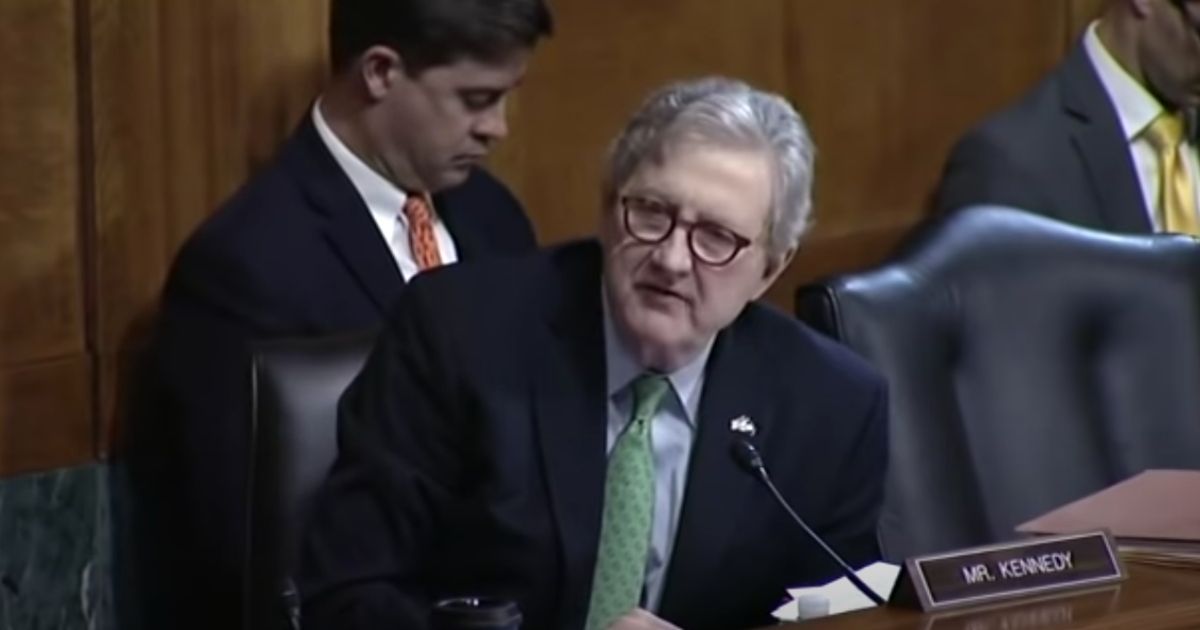It’s a fascinating study in evasiveness: Put one of President Joe Biden’s nominees for federal court positions up before the Senate Judiciary Committee and watch them try to answer a simple question.
GOP Sen. John Kennedy of Louisiana has been doing it for some time now. He rarely gets an answer — although watching nominees fumble through their non-answers is both entertaining and enlightening.
The question is straightforward: Does the nominee agree or not with prosecutors refusing to prosecute cases “in the name of social justice?”
In cities like New York, Los Angeles, San Francisco and Philadelphia, there are progressive prosecutors who have been following this policy. It’s led, unsurprisingly, to a rise in crime in those locales. (We’ve been documenting the cause-and-effect relationship here at The Western Journal, and we’ll continue to do so. You can help us bring America the truth by subscribing.)
According to The Daily Caller, Kennedy was questioning three separate nominees: Robert Huie, nominee for the U.S. District Court for the Southern District of California; Evelyn Padin, nominee for U.S. District Judge for the District of New Jersey; and Jennifer Rearden, nominee for the U.S. District Court for the Southern District of New York.
None would give a straight answer.
Here’s the question Kennedy posed to Huie: “I’d like to ask your opinion on something. We have a number of prosecutors who have chosen, in the name of social justice, not to prosecute an entire class of cases, despite the fact that their legislature has passed these criminal statutes. Do you think that’s proper?”
“Sen. Kennedy, I think I can speak to that issue very broadly in the federal context based on my experience as a prosecutor,” Huie started.
“To phrase my opinion in constitutional terms on the federal side, Article II [of U.S. Constitution] directs that the president shall take care that the laws are faithfully executed. It’s long been recognized that there’s a principle of prosecutorial discretion –”
Kennedy stopped him and asked whether he agreed or disagreed with what these prosecutors were doing.
“Senator, I agree with the principle of prosecutorial discretion, exercised in the interests of the United States –” Huie continued.
“Do you agree with what these prosecutors are doing or do you disagree?” Kennedy interjected. Huie said he “would have to get a little more detail in order to opine on that.”
“Are you afraid to give me an answer?” Kennedy asked, before turning to Padin.
“One would have to look at the position that the prosecutor’s taking –” Padin said.
“I just explained it,” Kennedy interrupted again. “Some prosecutors have taken the position, despite the fact that their legislature has passed a criminal statute, that they’re not going to prosecute cases in violation of that statute. Do you agree with that or disagree with that?”
After a bit of word salad, Padin said this was “an area that really falls within the executive part of government.”
“Are you afraid to give me an answer?” Kennedy asked.
“No, I think it’s a complicated incident,” Padin said.
[firefly_embed]
[/firefly_embed]
We then moved to Rearden — who, unbelievably, was originally nominated by former President Donald Trump. (Biden renominated her in January.)
“Senator, I am aware that prosecutors must act consistent with the 14th Amendment that comes up in connection with selective prosecution,” Rearden answered.
“But do you agree with the prosecutors or disagree?” Kennedy responded.
“It’s not anything that I have studied,” she said.
After a bit more back and forth, we inevitably arrived at the same question by Kennedy: “Are you afraid to give me your answer?”
“No, senator, I would give you an answer if I had it. I’m doing my best to answer your question,” Rearden said.
This isn’t the first time this has happened, either. In December, Anne Traum, a nominee for U.S. District Judge for the District of Nevada, was asked the same question at least eight times and couldn’t come up with a cogent response.
[firefly_embed]
[/firefly_embed]
She did, however, answer what her favorite color was in one try: “Blue.”
The reason why it’s easier to get a favorite color out of these judicial nominees than it is to get a position on whether prosecutors like Los Angeles’ George Gascón, New York City’s Alvin Bragg or Philadelphia’s Larry Kramer are right to pursue progressive policies is likely a simple one.
Saying they agree with prosecutorial leniency is career suicide. On the other hand, they probably do agree with it. So, Kennedy could have asked the same question for hours and Huie, Padin and Rearden would have continued to evade, evade, evade.
Their favorite color? Probably not “a complicated incident” or something they needed to study.
This article appeared originally on The Western Journal.

























 Continue with Google
Continue with Google